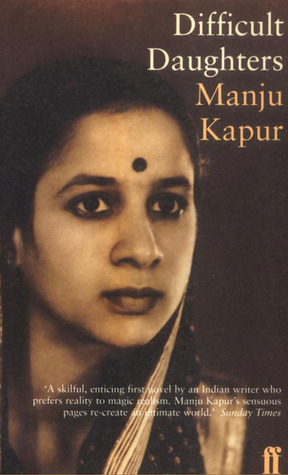Our book group choice for March 2007 is Difficult Daughters by Manju Kapoor. Set around the time of Partition and written with absorbing intelligence and sympathy, Difficult Daughters is the story of a woman torn between family duty, the desire for education, and illicit love.
Difficult Daughters is a novel by Manju Kapur, set in Amritsar, India, during the time of World War II and the Partition. The story follows Virmati, a young woman who is torn between her desire for education and the lure of illicit love.
Virmati is born into a high-minded household. Her father is a doctor and her mother is a social worker. Virmati is intelligent and ambitious, and she dreams of going to college and becoming a doctor herself. However, her family’s expectations for her are different. They want her to get married and have children.
Virmati’s life is changed forever when she meets Harish, a married professor at her college. Harish is immediately drawn to Virmati’s intelligence and beauty. He begins to pursue her, and she eventually falls in love with him.
Harish’s love for Virmati is passionate and obsessive. He is willing to do anything to be with her, even if it means leaving his wife and children. Virmati is torn between her love for Harish and her loyalty to her family. She knows that if she chooses Harish, she will be disowned by her family.
Additional Themes
- The novel also explores the themes of female education, social activism, and the Partition of India.
- Virmati’s decision to pursue higher education is seen as a radical act by her family and community. She is often criticized for being “too Westernized” and “un-Indian.”
- Virmati is also a social activist. She participates in the Satyagraha movement, which is a nonviolent protest against British rule. Her activism puts her at odds with her family, who believe that women should not be involved in politics.
- The Partition of India is a major turning point in the novel. It forces Virmati and Harish to flee their home and start a new life. The Partition also brings to light the deep divisions between Hindus and Muslims in India.
Discussion Questions
- What are the different ways in which the daughters in the novel are “difficult”?
- How does education shape the daughters’ understanding of the world and their place in it?
- What are the different ways in which the daughters challenge the traditional expectations of women in their society?
- How do the daughters’ relationships with their mothers reflect the different values and expectations of their respective generations?
- What are the different ways in which the daughters experience loneliness and isolation?
- How do the daughters’ relationships with men reflect the patriarchal nature of their society?
- How does the novel explore the theme of sexual violence?
- What are the different ways in which the daughters find their voices and assert their agency?
- How does the novel challenge the traditional narrative of the “good” daughter?
- What are the different ways in which the novel explores the theme of motherhood?
- How does the novel reflect the social and political changes that were taking place in India in the 1970s?
- How does the novel challenge the traditional notion of “home”?
- What are the different ways in which the novel explores the theme of identity?
- What are the different ways in which the novel ends?
- What is the significance of the title, Difficult Daughters?
- To whom would you recommend this book?

